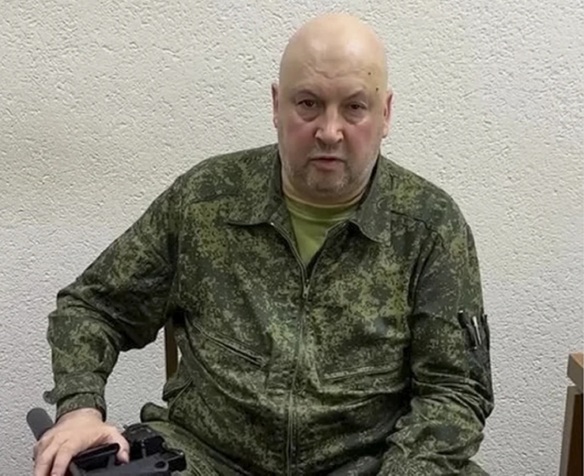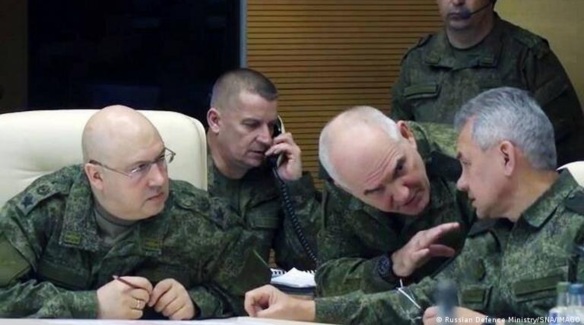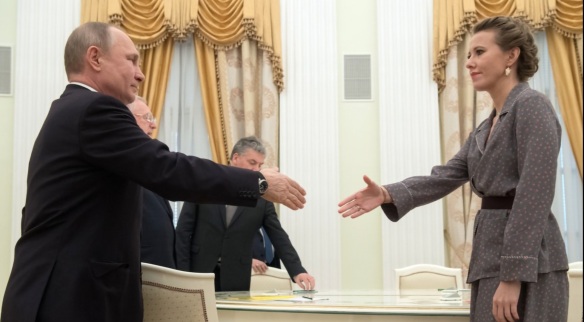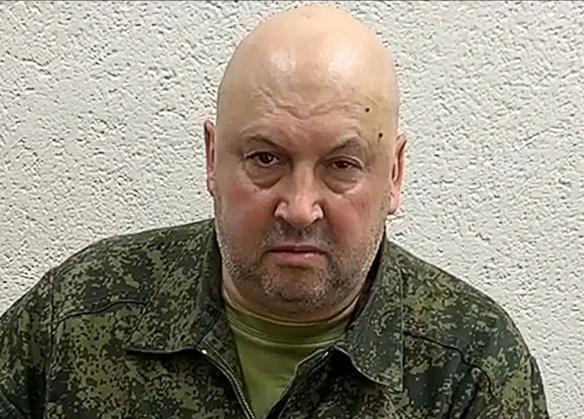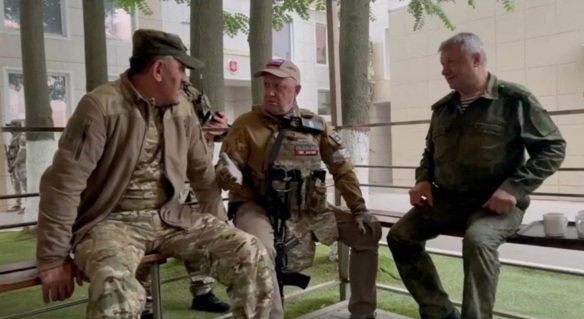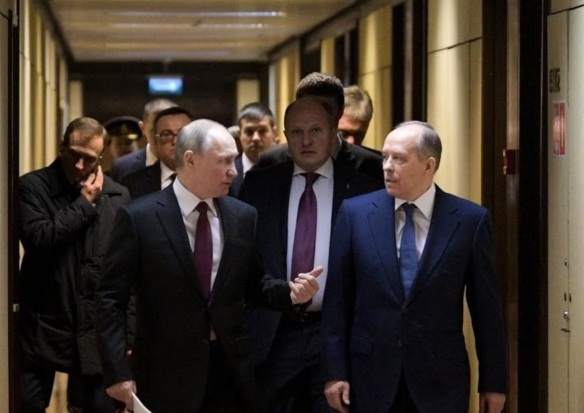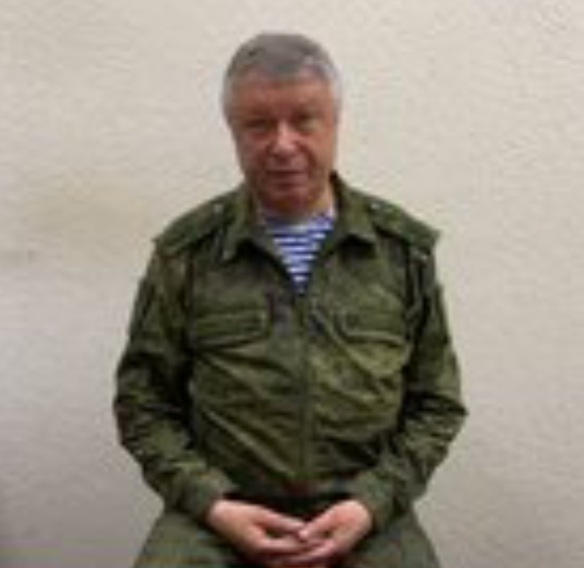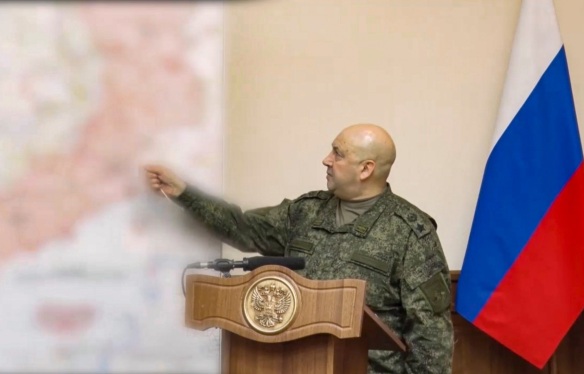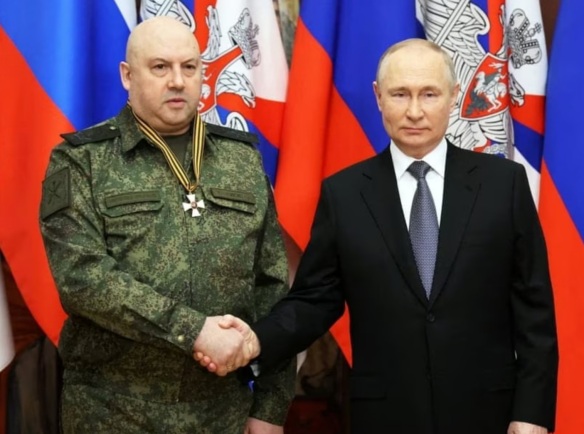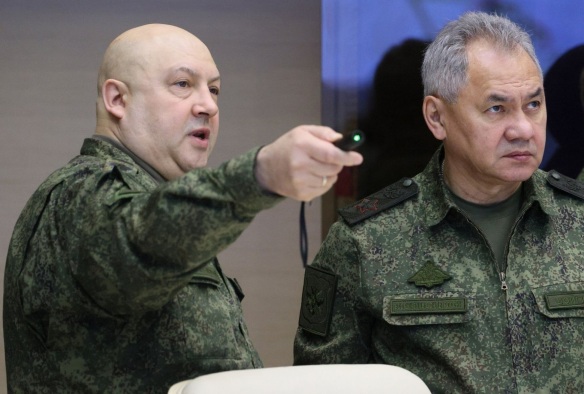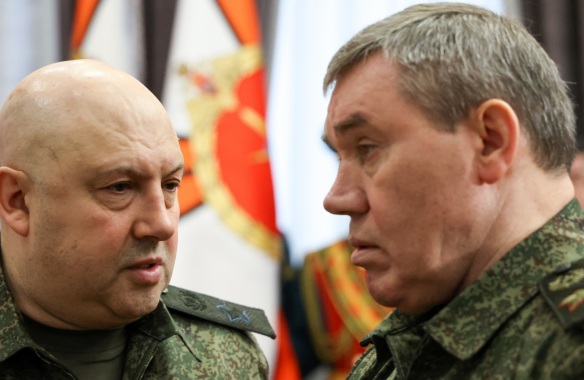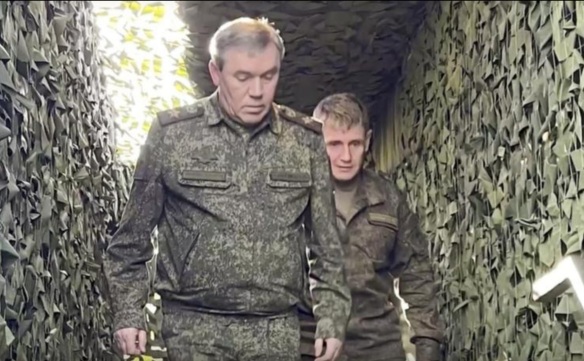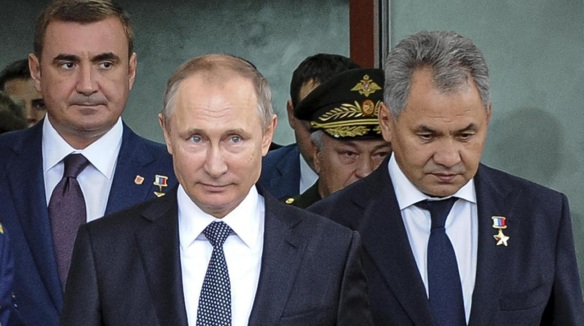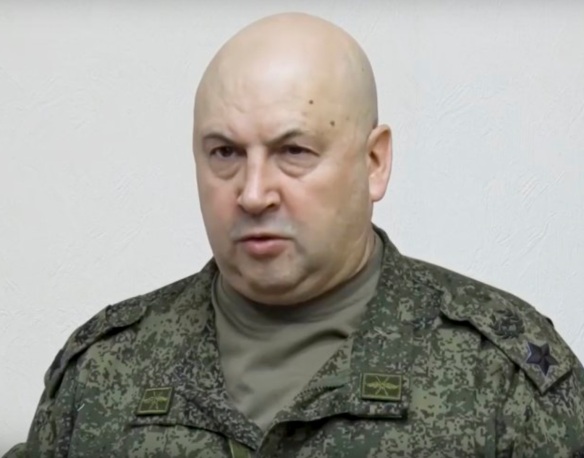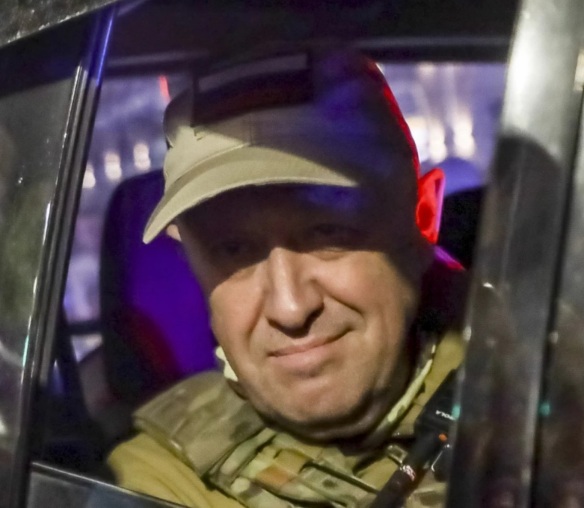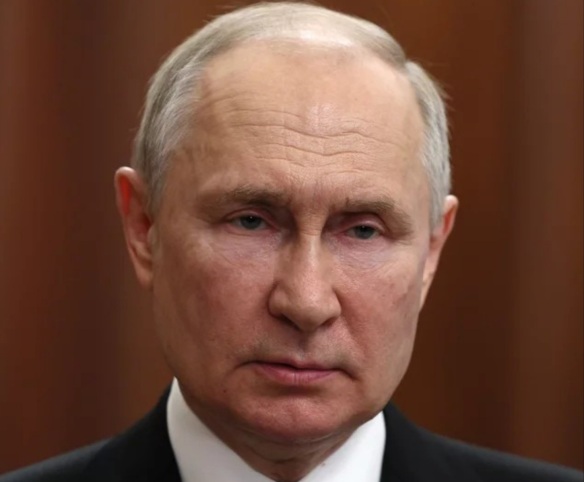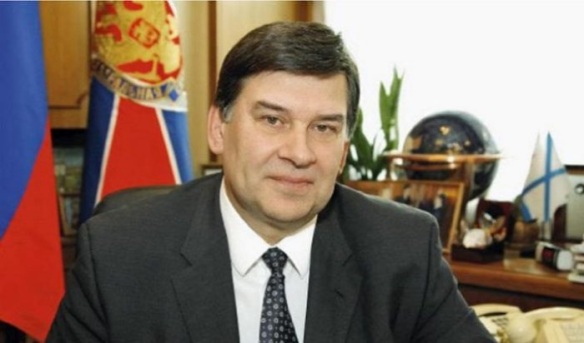
US airmen and marines (above) load M777 artillery pieces marked for delivery to the Ukrainian Armed Forces on an US Air Force transport plane. Many weapon systems sent into Ukraine have had a multiplier effect on the battlefield. Firepower in the form of multiple launch rocket systems, self-propelled artillery, and heavy caliber guns, transported possibly along the now heavily traveled supply lines from both Poland and Romania enabled the Ukrainian Armed Forces to launch two highly-successful counteroffensives. Presented here are some ruminations on Russia’s failure to initially shut the door to the massive levels of military assistance to the Ukrainian Armed Forces from the US, other NATO Member States and the EU via Poland, Slovakia, Hungary, and Romania. Emphasis is placed on the likely reasons why Russia went into Ukraine militarily without addressing the potential impact of Western resupply of Ukrainian forces. To that extent, issues considered include: whether the Russian Federation General Staff was responsible for this considerable delinquency or was the Kremlin near criminally remiss for not heeding likely recommendations of the military chiefs and their war planners.
Intriguingly, Russian Federation President Vladimir Putin launched the Ukraine War lacking a strategy that took into consideration of what Vooruzhonnije Síly Rossíyskoj Federátsii (the Armed Forces of the Russian Federation, hereinafter referred to as the Russian Federation Armed Forces) would come up against. What was seemingly completely missed or misunderstood was the degree of support from the US and NATO Member States that Kyiv would receive. No effort, that was apparent, was made to obviate the ability of the US and its NATO allies to supply Ukraine at will as part of the military strategy. From the start, conquering Kyiv was the focus as if Putin, his foreign and national security policy team at the Kremlin, and his senior commanders in the Russian Federation Armed Forces. Perhaps, for Putin, the conquest of Ukraine was a dream on which he could feast his imagination. That was at least until the matter was reduced to reality. If one might think of Putin at all as a rational actor, it would seem Putin has painted himself into a corner. That is quite unlike Putin. Some might say that after all the years of accomplishments and successes, and all the experience, he was bound to make one big mistake. It is a real head rubber.
Presented here are some ruminations on Russia’s failure to initially shut the door to the massive levels of military assistance to the Ukrainian Armed Forces from the US, other NATO Member States and the EU via Poland, Slovakia, Hungary, and Romania. Emphasis is placed on the likely reasons why Russia went into Ukraine militarily without addressing the potential impact of Western resupply of Ukrainian forces. To that extent, issues considered include: whether the Russian Federation General Staff was responsible for this considerable delinquency or was the Kremlin near criminally remiss for not heeding the recommendations of the military chiefs and their war planners; whether the door was left wide open between Poland Slovakia, Hungary, and Romania with Ukraine because they were hamstrung by Putin’s concept that a successful “lighting strike in Ukraine” could be achieved even though the idea was apparently developed in the abstract; and, whether they had little choice but to acquiesce to the manifestations of Putin’s sense of vulnerability over Ukraine’s close ties to the US, the EU, and NATO. Unless one was actually behind closed doors of conference rooms in the Kremlin and the national security bureaucracies in Moscow, or “reading someone’s mail,” one cannot know for certain how the decision concerning resupply from western Ukraine was made or maybe not made. The best informed guess would inevitably be an interpretation. While “ruminating”, greatcharlie sought to stay grounded within the realm of what would actually be possible in Putin’s regime given what is known about it. Insights offered here are occasionally supported with historical examples of timeless relevance that immediately came to mind or actually helped to generate ruminations. Causa latet, vis est notification. (The cause is hidden, the result is obvious.)

Chairman of the Joint Chiefs of Staff US Army General Colin Powell (above) at press conference at the Pentagon on January 23, 1991. When a military campaign is launched, often an objective becomes separating an opposing army from what gives it support and what allows it to continue to generate combat power. Acting in this manner against an opponent is referred to as acting decisively. During the Persian Gulf War, Operation Desert Storm, the concept of separating Iraqi forces in Kuwait from resupply as well as command and control from the Iraqi military and political leadership was expressed without ambiguity by then Chairman of the Joint Chiefs of Staff US Army General Colin Powell during a press conference at the Pentagon on January 23, 1991. He famously stated: “Our strategy to go after this army is very, very simple. First, we’re going to cut it off, and then we’re going to kill it.”
Why Is Resupply an Issue?
When sent to war, the purpose of an army is to use its trained troops to deliver calculated lethal violence in protection of their country and its values wherever they are ordered to go. Not to be forgotten, is the necessity that the army’s troops place their very lives on the line in that pursuit. Equally important to note, not all countries have the same values. The values of the Russian Federation, particularly those that compelled the invasion of Ukraine, are quite different, for example, from those of the United Kingdom, France, or Germany. As professionals, army commanders act to the best of their knowledge and experience, use their troop in accordance with their army’s doctrine and in obedience to the concept and intent laid out by the army’s senior leadership. When it is the case, the army leadership acts in fol)owing with the concept and intent of their country’s political leadership. Such was the case when the Russian Federation Armed Forces were directed by Putin and ordered by the Russian Federation General Staff to invade Ukraine.
Today, armies can deploy with a considerable amount of supplies, but supplies begin to deplete as soon as the fight is underway. Nevertheless, to keep the army going, long before it becomes engaged, considerations and arrangements are made by planners and logistical (supply) officers to transport supplies wherever they are needed. Losing the ability to be resupplied means an army can fight only until the point when it metaphorically and literally, as one element of resupply, runs out of gas. To that extent, the most extreme of human endeavors becomes an even greater challenge for troops in that army. Whether resupply is possible can more often mean the difference between victory and defeat.
To be a useful, effective fighting force on the battlefield, critical items such as bullets, grenades, rifles, other small arms, Kevlar vests, phones, petroleum, oil lubricants, and all and elements as replacement troops, and troop medical evacuation must get up to where the fight is. As shortages become problematic, commanders must begin to economize, their ability to act will be reduced, and subsequently their army becomes far less effective. The commander of the opposing army, if a capable commander, will discern the change, recognize the advantage presented and seek to exploit it as best as possible. The decision would need to be made on whether the army with dwindling supplies should be withdrawn. If the situation reaches the point when the commander can no longer act to alter the army’s situation, his army is being battered, or his army is cut off and has no available means of egress, he may be forced to surrender. While this description is somewhat oversimplified, it lends support for the idea that when a military campaign is launched, often an objective becomes separating an opposing army from what gives it support and what allows it to continue to generate combat power. Acting in this manner against an opponent is referred to as acting decisively.
During the Persian Gulf War, Operation Desert Storm, the concept of separating Iraqi forces in Kuwait from resupply as well as command and control from the Iraqi military and political leadership was expressed without ambiguity by then Chairman of the Joint Chiefs of Staff US Army General Colin Powell during a press conference at the Pentagon on January 23, 1991 alongside the US Secretary of Defense Dick Cheney. In the hour-long briefing, which detailed the first week of operations of the 28-nation coalition against Iraq, Powell famously stated: “Our strategy to go after this army is very, very simple. First, we’re going to cut it off, and then we’re going to kill it. To cut it off, that began last week when we started to go after the nerve center, the brains of the operation, the command and control of the operation, and the lines of communication that come out of Baghdad and other places in the country.”
One might have expected that Russian Federation Armed Forces top commanders and planners, in a similar vein, might have taken a similar tack toward the Ukraine Armed Forces. It might have been expected that they would have recognized that resupply not so much from Ukrainian arsenals but from those of US, other NATO Member States, and other countries in the EU would need to be blocked, cut off in some way. Yet, nothing remotely similar to what Powell expressed in 1991 was heard from theMinisterstva oborony Rossiyskoy Federatsii (Ministry of Defense Russian Federation) or General’nyy shtab Vooruzhonnykh sil Rossiyskoy Federatsii (General Staff of the Armed Forces of the Russian Federation), or from Putin, himself, about cutting Zbrojni syly Ukrayiny (Armed Forces of Ukraine, hereinafter referred to as the Ukrainian Armed Forces) off from resupply. There were no feigned movements such as moving Russian Federation forces to points outside Ukraine from which a blocking operation could best be launched in order to signal the intention to cut the Ukrainian Armed Forces off from resupply. Nothing was done sufficiently enough to cause supporters of the government of Kyiv to second guess any planned efforts to resupply the Ukrainian Armed Forces. In view of the potential decisive impact from contributions by the 30 countries in NATO, particularly the US with its military largess, it would seem some Russian Federation Armed Forces commanders and planners thinking logically would urge the Russian Federation General Staff to suggest scrapping the operation until the problem of the Western resupply threat was resolved.
A near endless list of situations during wars in which resupply determined the outcome of battle or even the war, itself. For example, armies have often encountered difficulties in cutting off resupply on a strategic level when fighting a determined opponent. Occasionally political leaders and army commanders have been slow in recognizing the opportunity to act decisively to mitigate resupply efforts on a strategic level. Armies have faced difficulties on the tactical level against a smaller force of well-trained, well-organized, and well-led opposing troops, even during a siege, when sufficient resupply has been made available to them
Ho Chi Minh Trail
The Ho Chi Minh Trail (Đường mòn Hồ Chí Minh) was a supply system that provided support, in the form of manpower and materiel, to the Communist insurgency, Viet Cong, and the People’s Army of Vietnam (North Vietnamese Army) during the Vietnam War. It comprised a logistical network of roads and trails that ran from North Vietnam to South Vietnam through the kingdoms of Laos and Cambodia during the Vietnam War. Initially troops, pushing heavily laden bicycles, driving oxcarts, or carrying supplies on their backs, moved hundreds of tons of supplies along it. However, trucks would become the primary means of moving supplies and troops. By 1969, tgere was even a pipeline crossed the Lao frontier through the Mu Gia Pass and, by 1970, it reached the approaches to the A Shau Valley in South Vietnam. The plastic pipeline, equipped with numerous small pumping stations, managed to transfer diesel fuel, gasoline, and kerosene all through the same pipe. By the end of 1970, the number of pipelines entering Laos increased to six that year. As a whole, supply efforts through trail were quite effective, which no mean feat given US efforts to thwart effort through trail included attacks from a CIA-raised clandestine army and the most intense air interdiction campaign in history. Mitigating the effects of US operations to destroy the trail was an existential effort. One might say the Ho Chi Minh Trail was the “center of gravity” for the Communists. Its loss probably would have led to their defeat in the war. As long as supplies could get to the Viet Cong and North Vietnamese Army, their war effort could continue with vigor which complicated US-led efforts to secure South Vietnam for the government in Saigon. South Vietnam would eventually surrender to North Vietnam.
Battle of the Atlantic 1939-1945
During World War II, Germany acted robustly to prevent merchant ships from carrying food, raw materials, troops and their equipment from North America to the United Kingdom. If they had succeeded, the outcome of war might have been radically different. The United Kingdom might have been starved into submission, which would have been complete strain on the morale. Its forces and those of its allies worldwide likely would have been deeply impacted. The supply line from the US was essentially the beating heart, the center of gravity, of the United Kingdom’s war effort. The threat to the movement of ships across the Atlantic came in the form of German submarines, the “Unterseeboot” or U-boat. United Kingdom Prime Minister Winston Churchill once wrote that, “The only thing that ever really frightened me during the war was the U-boat peril.”
At the start of World War II, the Befehlshaber der Unterseeboote (Commander of the Submarines) was Konteradmiral (Rear Admiral) Karl Dōnitz. Dönitz pushed for a German fleet that consisted almost entirely of U-boats, claiming that depriving Germany’s enemies of vital supplies such as food and oil would be the most effective way to achieve victory. He claimed that given 300 U-Boats of the latest design, the Type VII, he could defeat the entire Royal Navy. He would utilize them in tactical formations that would later be called “wolfpacks”. Dőnitz’s superior, Oberbefehlshaber der Kriegsmarine (Commander-in-Chief of the Navy) and Großadmiral, Oberkommando der Marine (the Naval High Command) Erich Raeder, was uninterested in his theories. Raeder was a traditionalist whose focus was surface warfare. Raeder also judged that Germany could not contest the Royal Navy for control of the sea. Even more, Raeder believed submarine warfare was cowardly. By 1941, although relatively small in number, U-boats under then Vizeadmiral (Vice Admiral) Dőnitz were threatening Allied shipping as far as the US east coast. By the end of 1942, U-boat “wolfpacks” were achieving considerable success in sinking merchant ships. By early 1943, the United Kingdom’s resources, especially oil, were running out, and it became a question of whether Allied shipyards could build merchant ships fast enough to replace the tonnage that was being sunk.
Finally recognizing the value of then Admiral Dönitz concepts on the effective conduct of submarine warfare, in January 1943, German Führer und Reichskanzler Adolf Hitler saw to it that he was advanced to the rank of Großadmiral (Grand Admiral) and replaced Großadmiral Erich Raeder as Oberbefehlshaber der Kriegsmarine and Großadmiral, Oberkommando der Marine. Interestingly, he retained his post as Befehlshaber der Unterseeboote. Dőnitz was given the authority to act as he saw fit with German naval forces too late. At that juncture, Dőnitz had 200 operational U-boats. By April 1943, his U-boats were clearly struggling to make an impact. The Allies were sinking German submarines in greater numbers, with 45 being destroyed in the months of April and May. Aggressive Allied anti-submarine tactics were aided by the introduction of new technology. Long-range aircraft were equipped with centimetric radar and directed based on Ultra intelligence from intercepts of Kriegsmarine Enigma code communications. The mass production of Liberty Ships in US shipyards would ensure that the Allies would overcome attrition rates and win the Battle of the Atlantic. Without the victory, the Allies would not have been able to land forces ashore in the Mediterranean Theater or at Normandy.

In Operation Sonnenblume, in 1941, the German Afrika Korps‘ first offensive in North Africa, it sought to advance on Alexandria and Suez. In that advance, the capture of Tobruk was a priority as it was the only deep water port in Eastern Libya and would have provided the Germans with the closest supply port to the Egypt–Libya border. Of some significance is the fact that the one the renowned military commanders to emerge from the war led the attack on Tobruk: Generalleutnant (Lieutenant-General) Erwin Rommel. In 1940, Rommel commanded the 7th Panzer Division during the invasion of France where he demonstrated skill in the new tactic of blitzkrieg. He was a military officer who knew his business. When Rommel struck, he achieved complete surprise against British Army units in Libya’s eastern coastal region. The British Army was forced to retreat several hundred miles across the desert toward Tobruk. At Tobruk, the British Army and its allies held on. The Germans frequently bombarded the port. A blockade had been organized to thwart British resupply and reinforcement efforts. However, ships of the Royal Navy’s Mediterranean Station ran the blockade, and provided Tobruk’s defenders gunfire support, supplies, fresh troops and by ferrying out the wounded. The defenders of Tobruk received enough resources to keep up the fight. Rommel was stopped and the siege was lifted in December 1941.
Tobruk Siege 1941
In Operation Sonnenblume, from February 6, 1941 to May 25,1941, its first offensive in North Africa, the German Afrika Korps sought to advance on Alexandria and Suez in that advance, the capture of Tobruk was a main objective. Tobruk was the only deep water port in Eastern Libya and would have provided Rommel a supply port closer to the Egypt–Libya border than Benghazi, 900 kilometers or 560 miles west of the Egyptian frontier, which was within the range of Royal Air Force bombers; Tripoli was 1,500 kilometers or 930 miles to the west in Tripolitania. Of some significance is the fact that the one the renowned military commanders to emerge from the war led the attack on Tobruk: Generalleutnant (Lieutenant-General) Erwin Rommel. A veteran of World War I, from 1929 through 1933, Rommel served as an instructor at the Dresden Infantry School and from 1935 at the Kriegsakademie (German War Academy) at Potsdam. In 1940, Rommel commanded the 7th Panzer Division during the invasion of France where he demonstrated skill in the new tactic of blitzkrieg. He was a military officer who knew his business. When Rommel struck, his Afrika Korps achieved complete surprise against British Army units in Libya’s eastern coastal region of Cyrenaica. The British Army was forced to retreat several hundred miles across the desert towards Tobruk.
Recognizing that he had the opportunity to capture Tobruk before the British Army and its Allies had time to organize an effective defense, Rommel advanced aggressively to exploit it. The 9th Australian Division, dubbed “The Rats of Tobruk”, supported by British Army armor and artillery, repulsed initial German assaults on April 10, 1941 to April 14, 1941, and even when the fresh 15th Panzer Division was committed to the attack on April 30, 1941, the defenders held on. The Germans frequently bombarded the port with artillery and Luftwaffe (German Air Force) dive-bombers and medium bombers. A blockade had been organized to thwart British resupply and reinforcement efforts. However, ships of the Royal Navy’s Mediterranean Station–to include the Inshore Squadron–ran the blockade. Indeed, known as the “Tobruk Ferry Service”, Royal Navy and Royal Australian Navy warships provided gunfire support, supplies, fresh troops and by ferrying out the wounded. The defenders of Tobruk were provided enough resources to keep up the fight. The Royal Air Force flew defensive sorties from airfields far away in Egypt. The siege of Tobruk was the first occasion in the war that German Panzer units had been stopped. The siege was lifted in December 1941. It must be noted that via Operation Crusader, launched on November 27, 1941, Tobruk was relieved by the British Eighth Army which after September 1941, controlled British Army and other Allied ground forces in the Western Desert. It seems worthwhile to note the Fall of Tobruk occurred when Generalfeldmarschall Erwin Rommel commanding Panzerarmee Afrika (Panzer Army Africa) which controlled the Afrika Korps and additional German units deployed to Africa as the 90th Light Infantry Division), as well as the Italian X Corps and XX Corps, attacked on June 20, 1942 with massed air support, broke through a weak point on the eastern defensive perimeter, and captured the port. Although the garrison on the western perimeter had not been attacked, it was cut off from supplies and transport. Lacking the means to escape, the majority had to surrender; 33,000 prisoners were taken. Rommel had indeed learned lessons during the 1941 siege.
Être Voué à L’échec dès le Début
Even if everything else had been planned and arranged in the correct manner in every other aspect for the invasion, the viability of the entire plan would still rest on the ability of the Russian Federation Armed Forces to at best destroy, acceptably disrupt, or at the absolute minimum, delay resupply from the US, EU, and NATO. Without being able to control the movement of resupply in the West, the plan for the invasion should have been scrapped or the attack should have been postponed until that was nailed down. The reasoning behind such a decision has already been made abundantly clear looking at the circumstances of the handful of examples presented here already. As it was, the “special military operation” was launched, half-baked, and billions of dollars in military assistance has reached the Ukrainian Armed Forces via their country’s western border. Many weapon systems sent into Ukraine have had a multiplier effect on the battlefield. Firepower in the form of multiple launch rocket systems, self-propelled artillery, and heavy caliber guns, transported possibly along the now heavily traveled supply lines from both Poland and Romania enabled the Ukrainian Armed Forces to launch two highly-successful counteroffensives. On August 29, 2022, a counteroffensive was launched to eject Russian forces occupying the Kherson and Mykolaiv oblasts (provinces). On September 6, 2022, a counteroffensive was launched to eject Russian forces occupying the Kharkiv, Donetsk, and Luhansk oblasts. Given the unsatisfactory nature in which the Russian invasion was arranged and indeed, has been prosecuted, the decision to go into Ukraine was the sort that if made during an instance of saber rattling and war fever in a highly-industrialized democracy, would very likely lead to the impeachment of a national leader.
Ruminations
To set the record straight from the outset, greatcharlie believes that if Russian Federation forces were selectively positioned in Western Ukraine, the Ukrainian Armed Forces would have likely used their formidable and quite impressive drone arsenal to bombard them. They might have achieved the same relative success that they have achieved with Russian Federation forces in the east and south and around Kyiv. Once aptly prepared, Ukrainian special forces would likely do their part to hunt down and displace and destroy any Russian Federation troops settled in their country’s Western region.
Commanders and planners in the Russian Federation Armed Forces would unlikely have known or believed any of that would have been possible before the invasion. One would need to consider other reasons for the omission of a mission to thwart, to an extent blockade resupply to the Ukrainian Armed Forces from the West.The Romania-Ukraine border is 649 kilometers or around 403 miles, but it is discontinuous. The. Moldova-Ukraine border is 1,222 kilometers or 759 miles. However, along the Dniester River, between Moldova and Ukraine, is the autonomous Republic of Transnistria. Thereby, 454 kilometers or 282 miles of the Moldova-Ukraine border stand as the de factor border between Transnistria and Ukraine.

To the left of the above map are all countries situated on Ukraine’s western border. As Ukraine is looked upon in Europe as a very large country, perchance the area in western Ukraine that would need to be covered was judged by military commanders and planners in the Russian Federation General Staff as too large and deemed too difficult to control or monitor, surveil, and launch successful interdiction attacks and raids from. The Polish–Ukrainian border has a total length of 529 kilometers or 329 miles to 535 kilometers or 332 miles according to different sources. The Romania-Ukraine border is 649 kilometers or around 403 miles, but it is discontinuous. The Slovakia-Ukraine border is 97 kilometers or a bit over 60 miles. The Hungary-Ukraine border is roughly 103 kilometers or 60 miles long. It its located in Hungary’s Tisza river valley of its northeast. The Moldova-Ukraine border is 1,222 kilometers or 759 miles. However, along the Dniester River, between Moldova and Ukraine, is the autonomous Republic of Transnistria. Thereby, 454 kilometers or 282 miles of the Moldova-Ukraine border stand as the de factor border between Transnistria and Ukraine.
Omission or De-emphasis?
Negligentia sempre habet infortunam comitem. (Negligence always has misfortune for a companion.) Imaginably, there is a moderately rational reason behind the decision to attack the second largest country in Europe, 603,500 square kilometers or 233,000 square miles, without being fully prepared. Ukraine is second largest in size to Russia, which is 17,098,246 square kilometers or 6,601,670 square miles. As Ukraine is looked upon in Europe as a very large country, perchance the area in Western Ukraine that would need to be covered was judged as too large by military commanders and planners in the Glavnoe operativnoe upravlenie General’nogo štaba Vooružёnnyh sil Rossijskoj Federacii (the Main Operational Directorate of the General Staff of the Russian Federation) and commanders and planners at the lower level in Yuzhnyy Voyennyy Okrug (the Southern Military District) and the Zapadnyy Voyennyy Okrug (the Western Military District) and deemed too difficult to control or monitor, surveil, and launch successful interdiction attacks and raids into. The Polish–Ukrainian border is the state border between Poland and Ukraine. It has a total length of 529 kilometers or 329 miles to 535 kilometers or 332 miles according to different sources.
Concisely and admirably described by the Mission Opérationnelle Transfrontalière (Transfrontier Operational Mission), an association that was set up in 1997 by the government of France to resolve issues for entities concerned with cross border issues, the Poland-Ukraine border begins at the tripoint formed by the Ukrainian, Polish and Slovak borders, in the middle of the Eastern Carpathian mountains. The demarcation runs initially towards the east, arriving at the Ushok Pass and the source of the San River, whereupon it turns north-west to follow the river for around 50 kilometers or 31 miles. It subsequently leaves the river to take a north-easterly direction, crossing the region known as the “Przemyśl Gate”, where mountains meet lowlands. The border then crosses large swathes of agricultural land, to reach the Bug River, which forms the last third of its demarcation. It ends at the tripoint formed by the borders of Poland, Ukraine and Belarus. Poland is a NATO Member State and an EU border state.
The Romania-Ukraine border is 649 kilometers or around 403 miles, but it is discontinuous. Again using a description from the Mission Opérationnelle TransfrontalièreThe Republic of Moldova separates the border into two segments. The first in the west, at the tripoint between the Hungarian-Romanian and Hungarian-Ukrainian borders. That segment then continues across the East Carpathian mountains and terminates at the tripoint formed by the Moldovan, Romanian and Ukrainian borders. The second segment begins at the second tripoint between the Moldovan, Romanian and Ukrainian borders, on the north bank of the Danube River, and terminates as it reaches the Black Sea. Romania is a NATO Member State and an EU border state. The Slovakia-Ukraine border is 97 kilometers or a but over 60 miles long. Slovakia is also a NATO Member State and an EU border state. The Hungary-Ukraine border is roughly 103 kilometers or 60 miles long. It is located in Hungary’s Tisza River Valley in the country’s northeast. As with the preceding three countries discussed, Hungary is a NATO Member State and an EU borderstate. The. Moldova-Ukraine border is 1,222 kilometers or 759 miles. However, along the Dniester River, between Moldova and Ukraine, is the autonomous Republic of Transnistria. Thereby, 454 kilometers or 282 miles of the Moldova-Ukraine border stand as the de factor border between Transnistria and Ukraine. Transnistria is an autonomous republic aligned since 1992 with the Russian Federation. Russian Federation Armed Forces units have also been garrisoned there since 1992. To that extent, anyone providing military assistance to Ukraine would hardly choose to move anything through Moldova as Russian Federation intelligence services posted in Transnistria would likely be able to position themselves to monitor such resupply activities. Moving through Moldova would very likely be deemed too risky, unsafe. To an extent, one might say any effort by Russian Federation Armed Forces to monitor resupply efforts for Ukraine would indicate commanders and planners were covering the matter. Perhaps the Russian Federation General Staff sold that notion to Putin. However, while a few things could be done from Transnistria, given the sheer size of its border with Ukraine, and its position south and toward the east with respect other bordering countries, it would unlikely be enough to make a real difference. It would seem Putin did not want to stir trouble over Transnistria issue. The Russian Federation Armed Forces there have remained relatively quiet, and the West has more or less left the autonomous republic alone. If covert monitoring has been transpiring along or across the Transnistria border, it is apparently not having an impact. Thus, the focus here is on resupply from Poland, Slovakia, Hungary, and Romania.

Russian Federation President Vladimir Putin (center), Russian Federation Defense Minister General Sergei Shoigu (right), and Chief of Staff of the Russian Federation Armed Forces General Valery Gerasimov (left). Commanders and planners in the Russian Federation Armed Forces apparently “wholeheartedly” accepted the idea that the Ukrainians would acquiesce as in 2014. Despite losses inflicted upon Ukrainian defenders and territorial gains, in eastern and southern Ukraine as well as Kyiv, the mission to completely snuff out the combat power and resolve of the Ukrainian Armed Forces and force a sort of mass capitulation was not achieved. The losses of the Russian Federation Armed Forces have been exponentially higher. It seems most apparent that the Russian Federation General Staff had moved forward without a satisfactory long-term plan for the invasion. Indeed, by results alone, one might infer that there were actually no contingency plans to draw upon for the invasion of Ukraine.
Folly, Doctor-Like, Controlled Skill
Commanders and planners in the Russian Federation Armed Forces apparently “wholeheartedly” accepted the idea–fiction–that the Ukrainians would roll over and play nice doggie à la 2014. Tomaten auf den augen haben. Despite losses inflicted upon the Ukrainian defenders and territorial gains, in eastern and southern Ukraine, the mission to completely snuff out the combat power and resolve of the Ukrainian Armed Forces and force a sort of mass capitulation was not achieved. In the end, the losses of the Russian Federation Armed Forces have been exponentially higher. It seems most apparent that the Russian Federation General Staff had moved forward without a satisfactory long-term plan for the invasion. Indeed, by results alone, one might infer that there were actually no contingency plans to draw upon for the invasion of Ukraine, with solutions for all conceivable challenges. Doing the “what-ifs” beforehand was probably viewed as walking out on thin ice “politically”. While the idea might be difficult for the reasonable to reconcile, it appears the massive enterprise was truly undertaken by Moscow on the fly.
Allowing the Russian Federation Armed Forces to perform in such a way would be very much unlike Putin given the record of his past behavior. True, over the past two decades, he has dropped some clangers. Even the most knowledgeable and experienced can make mistakes they learned to avoid long ago. That is human nature; the human element. Still, Putin’s actions are usually thoughtful, calibrated, well calculated, with the use of resources in a measured way to achieve the most favorable outcomes. Putin can surely tell the difference between real and unreal. He has not managed to stay in power since 2000 by engaging in Quixotic pursuits. This is something new. One wonders what could possibly come next for Ukraine and for the world.
Putin was oddly hooked on the idea that among the officers, men, and women of the Ukrainian Armed Forces, there was a lingering sense of Soviet unity equal to his own. This in itself was quite interesting as Putin was hardly known for truly displaying brotherly love toward former Soviet republics. He would create an environment of fear in his relationship with their respective leaders. After Euromaidan, the Ukrainians did not want any part of that. In his invasion day television broadcast of February 24, 2022, Putin would go as far as to implore the Ukrainian Armed Forces to submit to his will and allow Russian troops to again simply march into their country. There appeared to be a singular emotional commitment on his part to the ideas of Russian-Ukrainian unity and the fealty of the officers, men, and women of the Ukrainian Armed Forces to Moscow, to him. Putin “appealed” to members of the Ukrainian Armed Forces as follows: “I would also like to address the military personnel of the Ukrainian Armed Forces. Comrade officers! Your fathers, grandfathers and great-grandfathers did not fight the Nazi occupiers and did not defend our common Motherland to allow today’s neo-Nazis to seize power in Ukraine. You swore the oath of allegiance to the Ukrainian people and not to the junta, the people’s adversary which is plundering Ukraine and humiliating the Ukrainian people.” Putin continued: “I urge you to refuse to carry out their criminal orders. I urge you to immediately lay down arms and go home. I will explain what this means: the military personnel of the Ukrainian army who do this will be able to freely leave the zone of hostilities and return to their families.” If the matter were not so grave, his words might be looked upon as comical.
Putin seemed forgetful of, or totally oblivious to, the fact that he was responsible for the greatest humiliation of the Ukrainian Armed Forces when he ordered the “green men” of the Russian Federation Armed Forces into Crimea to seize Ukraine’s sovereign territory. Further, without firing a shot, the green men first corralled members of the Ukrainian Armed Forces much as sheep in their own garrison and then herded them out of Crimea. Knowing the Ukrainians as well as he claimed he did in the February 24, 2022 broadcast, Putin should have known the Ukrainians are not sheep. He should have been well-aware that there would be payback for what happened in 2014 and everything that has happened since. He surely knows that now.
In its ill-designed aspects influenced by the political leadership, the Russian Federation’s special military operation on a macro-level much resembles the failed German campaign, Operation Barbarossa, launched on June 21, 1941. Hitler provided empty assurances resulting from his baseless analyses to Oberkommando des Heeres (High Command of the Army) to the effect that “We have only to kick in the front door and the whole rotten edifice will come tumbling down.” Oberkommando des Heeres went along with Hitler’s concept that the campaign would be a short one, and that the Soviets would give in after suffering the shock of massive initial defeats. As a result, it did not develop a satisfactory long-term plan for the invasion. The shock and awe of the initial Blitzkrieg was dissipated by the vast distances, Supply challenges could not be overcome. There was a lack of sufficient manpower resources. German losses could not be sustained. After initial contact, there was stiff resistance from Soviet forces. Despite the serious losses inflicted on the Soviet Army the mission to completely destroy Soviet fighting power and force a capitulation was not achieved by January 7, 1942, and the operation was terminated 20 kilometers short of Moscow. Interestingly enough,a number er of fitting comparisons between Putin and a national leader whose blunders came as a result of being closed to the recommendations and entreaties of his or her top advisers, are those made with Hitler.
Delinquency
There is the real possibility that commanders and planners in the Russian Federation Armed Forces, attempting to hastily organize the massive Spetsial’noy Voyennoy Operatsii (Special Military Operation) were not even aware that the opportunity to destroy and disrupt the resupply effort for Ukraine was missed. Everything truly started off on the wrong foot from the get-go. By logic, at first glance this would seem unlikely. After all, the well-trained senior officers and planners of the Russian Federation Armed Forces would not be aware of the danger posed by Ukraine’s open western border. Perhaps there may have been some understanding among military planners that the situation there would be played-down in order to line up with thinking from the Kremlin. In the realm of conjecture, anything becomes possible. If such was the case, from that point onward, they could only hope nothing bad would come of that considerable omission.
The US educator and organizational theorist, Russell Ackoff was a pioneer in the field of operations research, systems thinking, and management science. In a research article entitled “A Major Mistake That Managers Make” in Handbook of Business Strategy, volume 7, number 1, January 2006, pages. 225-227, Ackoff wrote: “Errors of omission, lost opportunities, are generally more critical than errors of commission. Organizations fail or decline more frequently because of what they did not do than because of what they did.” Although the December 7, 1941 surprise attack of the Imperial Japanese Navy on Pearl Harbor was a tactical victory, it was also a strategic blunder, as the Japanese failed one of their most critical objectives: destroy the US aircraft carriers. Even worse, the Japanese failed to destroy the strategic oil reserves at Oahu, and the damage to docks and yards was slight. That oil reserve fueled the US Navy through the remainder of the war against Japan.

A well-intervaled column of German vehicles moves through the Ardennes Forest in 1940 (above). At the top of the list of historical causes for military blunders has been insufficient intelligence analyses as well as the failure of consumers to include valuable forecasts in their appraisals of situations. Consider for example how the military high command of France failed their government three times in 70 years by minimizing warnings about the intentions of Prussian and German Governments. In 1870, the Supreme Command of the French Imperial Army, with its attitude of debrouillez-vous (“We’ll muddle through somehow”), did not heed signaling that the Prussian Army would move via the Ardennes Forest through Belgium into France. In 1914, the French Grand Quartier Général (General Headquarters) did not heed indicia signaling that the Imperial German Army, to avoid French defenses on the Franco-German border, would move via the Ardennes Forest through Belgium into France. In 1940, the Anglo-French Supreme War Council, relying on the defenses of the Maginot Line, did not heed indicia signaling that the German Army would move via the Ardennes Forest through Belgium into France. Even with this history, in 1944, the Supreme Headquarters of Allied Expeditionary Forces in Europe ignored idicia signaling that the German Army might attempt to move via the Ardennes Forest into Belgium in an attempt to reach Antwerp and cut Allied Forces into two pieces. The result was the Battle of the Bulge in which US forces suffered an estimated 75,000 casualties.
Was Faulty Intelligence to Blame?
Quis, quid, ubi, quibus, auxiliis, cur, quomodo, quando? (Who, what, where, with what, why, how, when?) Very pertinent here is the attendant influence of faulty intelligence in understanding the situation of an opponent, strengths and weaknesses, capabilities and possibilities in the development of the concept and intent of an operation in terms of supply. It becomes a factor of some magnitude in planning support operations. It is imprudent for political leaders and top military commanders to ignore information from intelligence services that confirms some action by an adversary is very likely, imminent, or has been taken. Well at the top of historical causes for military missteps has been insufficient intelligence analyses as well as the failure of consumers to include valuable forecasts in their appraisals of situations.
Consider for example how the military high command of France failed their government three times in 70 years by minimizing warnings about the intentions of Prussian and German Governments. In 1870, the Supreme Command of the French Imperial Army, with its attitude of debrouillez-vous (“We’ll muddle through somehow”), did not heed signaling that the Prussian Army would move via the Ardennes Forest through Belgium into France. In 1914, the French Grand Quartier Général (General Headquarters) did not heed indicia signaling that the Imperial German Army, to avoid French defenses on the Franco-German border, would move via the Ardennes Forest through Belgium into France. In 1940, the Anglo-French Supreme War Council, relying on the defenses of the Maginot Line, did not heed indicia signaling that the German Army would move via the Ardennes Forest through Belgium into France. Even with this history, in 1944, the Supreme Headquarters of Allied Expeditionary Forces in Europe ignored idicia signaling that the German Army might attempt to move via the Ardennes Forest into Belgium in an attempt to reach Antwerp and cut Allied Forces into two pieces. The result was the Battle of the Bulge in which US forces suffered an estimated 75,000 casualties.
Referring again to the attack on Pearl Harbor, a newly discovered official US Government memorandum has revealed that intelligence collected about the activities of the Imperial Japanese Navy, led to assessments that Japan might attack the US on the West coast, the Panama Canal, and the US naval and military bases in Hawaii some time in December 1941. The Japanese Imperial Navy would eventually execute a devastating surprise, aircraft carrier-based, aerial attack and submarine attack on the US Naval Base and Headquarters of the US Pacific Fleet at Pearl Harbor, and aerial attacks against the US Army Base at Schofield Barracks and the US Army Air Corps Base at Hickam Field. Most US military commanders were bewildered by the successful attack which they never would have believed Japan could execute before it actually happened. By leaning into those beliefs, they were caught flat-footed by the attack. Their immediate responses were meager and ineffective.
In the case of Ukraine, it would seem Putin was provided faulty information. Some intelligence services apparently did more in the direction of providing fabrications than others.. From what can be gathered by newsmedia reports about its findings, the foreign intelligence service of Federal’naya Sluzhba Bezopasnosti Rossiyskoy Federatsii (Federal Security Service of the Russian Federation) or FSB, known as the organization’s 5th service. The 5th Service is a division that was established in 1998, when Putin was director of the FSB, to carry out operations in the countries that were formerly republics of the erstwhile Soviet Union. Its mission was to help ensure those countries remained within Russia’s orbit. Apparently, the 5th Service laid it on thick. There were allegedly many unproven, torrid statements on the nature of Ukrainian society made concerning the destructive impact of the West on the culture, morality, spiritually, self-image of the people, ultranationalists, and the leadership in Kyiv, and the Ukrainian people’s willingness to stand fast against an invasion.
Are Russian Federation Satellites Functioning?
One might imagine that there was a chance that intelligence, surveillance, and reconnaissance (ISR) capabilities by Russian Federation satellites could have assisted in covering the space and monitor and act against assistance efforts by supporting calibrated attacks on supply trains, especially readily observable ones traveling along roads and rails. Intriguingly, only a few short years ago, there was great concern expressed in the US about formidable Russian Federation satellites that were interfering with US satellites. As discussed in greatcharlie’s July 6, 2017 post entitled, “Trump to Meet With Putin at G-20 Gathering: Trump Seeks an Authentic Relationship with Russia”, there was the belief that Russia was developing the ability to approach, inspect, and potentially sabotage or destroy US satellites while they orbited the Earth.
Now, it seems, Russian Federation satellites must be able to provide a picture of the situation in Ukraine. True, as stated here, Ukraine is the second largest country in Europe, but, if many will pardon this expression, in greater terms, it is smaller than the State of Texas in the US, which has been regularly, intensely surveilled by the Russian Federation as it was before by the Soviet Union due mainly to the many massive US military and NASA bases and other facilities there. De quoi s’agit-il ici? It appears that a breakdown in Russian ISR capabilities from space much as its military, naval, and intelligence capabilities generally, had occurred long before the special military operation was launched.
Having been responsible for the preparedness of the Russian Federation Armed Forces, the Russian Federation General Staff had to have known something was awry. it had to have known whether they were up to the job in Ukraine. While the Russian Federation Armed Forces’ Zapad and Vostok exercises perhaps indicated that they were ready for war, surely the Russian Federation General Staff was fully aware of how numbers of troops, actions, reports were, to be frank, falsified. The most senior commanders may not have been sure themselves what the true capabilities of the Russian Federation Armed Forces were. If they were living in an illusion about how mighty their forces were, that Illusion was destroyed in the face of reality.

Snapshot of the initial wave of Ukrainian refugees (above). There is the possibility the commanders and planners in the Russian Federation Armed Forces may have believed there was more to gain by having a great flow of refugees pouring out of Ukraine to create problems, chaos and confusion, hostile reactions from populations of countries inconvenienced by overflows of Ukrainian refugees, and frustration among NATO, EU Member State capitals. Conceivably, the thinking from the Kremlin and subsequently the Russian Federation Armed Forces that if the roads out of Ukraine to Poland, Slovakia, Hungary, Romania, and Moldova were clogged, potentially military assistance could not get through, at least not efficiently. By weaponizing refugee flows an invasion would cause, it may have been believed a way found to split the seam between two possibilities. However, even in the best case scenario, the refugee exodus would be a temporary problem. If Western powers could not resolve the matter, they would at least be able to mitigate its immediate effects. Once the invasion began, humanitarian and refugee organizations of almost every kind jumped in feet first. The West could do more with assistance to stem the crisis than the Russian Federation could do by creating a refugee overflow crisis. As it turned out, the refugee crisis as the Kremlin might have envisioned and hoped did not materialize.
The Pitfalls of Creative Thinking
There is the possibility the commanders and planners in the Russian Federation Armed Forces may have believed there was more to gain by having a great flow of refugees pouring out of Ukraine to create problems, chaos and confusion, hostile reactions from populations of countries inconvenienced by overflows of Ukrainian refugees, and frustration among NATO, EU Member State capitals. That belief would very likely have been in following with the concept and intent disseminated from the Kremlin. The impact of a refugee surge was witnessed while war raged in Syria. During the 2015 Syrian Refugee Crisis, an estimated 1.3 million refugees seeking asylum literally jammed roads leading to Europe. European countries, especially the first ones along the refugees route that encountered them, were unable to handle their numbers immediately. Some capitals panicked. Many political, social, financial, and security issues subsequently arose. The refugee flow eventually subsided.
The Weaponization of Refugees
Conceivably, the thinking from the Kremlin and subsequently the Russian Federation Armed Forces that if the roads out of Ukraine to Poland, Slovakia, Hungary, Romania, and Moldova were clogged, potentially military assistance could not get through, at least not efficiently. By weaponizing refugee flows an invasion would cause, it may have been believed a way found to split the seam between two possibilities. Zwei fliegen mit einer klappe schlagen. However, even in the best case scenario, the refugee exodus would be a temporary problem. If Western powers could not resolve the matter, they would at least be able to mitigate its immediate effects. Once the invasion began, the UN with its many aid organizations as well as and other international and regional intergovernmental humanitarian and refugee organizations jumped in feet first. The US would work with capitals in Europe, especially Warsaw, and encourage through diplomacy and support with its wherewithal, a multilateral effort by government aid agencies. The EU acted in a similar way. The International Federation of Red Cross and Red Crescent Societies, CARE and other international and regional nongovernmental humanitarian and refugee organizations. Nongovernmental refugee and displaced persons organizations, and a variety of humanitarian organizations from around the world made their way to Poland, Slovakia, Hungary, Romania, and Moldova to get a handle on the problem.
As things went, the Russian Federation’s special military operation triggered a “regional forced displacement crisis.” By September 30, 2022, seven months after the invasion began, 7,536,433 Ukrainian refugees were registered outside of Ukraine. Reportedly, Poland and Germany received the most refugees; more than a million each. The Czech Republic took in the next highest number 438,926, followed by the US, the United Kingdom, France, Turkey, Italy, and Spain, each of which accepted from 100,000 to 300,000 refugees. Smaller numbers escaped to Hungary, Romania, Slovakia, and Moldova.
Interestingly, and doubtlessly to the consternation of the Kremlin and Russian Federation Armed Forces, not only is military assistance flowing freely into Ukraine from Poland but so are “returnees”. Clear data that documents how many of the 7.5 million Ukrainian refugees have returned home permanently, reportedly is unavailable. However as of September 20, 2022, over 6 million cross-border movements were made back into the country. Border crossing points in Poland as well as Romania are said to be receiving most of the returnees, with nearly 4.5 million crossings from Poland and nearly 1 million from Romania. In the aggregate, one might conclude that the West could do more with assistance than Russia could do by creating a refugee overflow crisis. In the end, the refugee crisis that the Kremlin may likely have envisioned and hoped for did not materialize. Vide et credere. (See and believe.)
Where Was the GRU?
As a military matter, intelligence on the situation in Ukraine to the extent it would impact the special military operation had to be of great interest specifically to Glavnoye Razvedyvatel’noye Upravleniye Generalnovo Shtaba (Main Intelligence Directorate of the General Staff-Military Intelligence) or GRU The GRU could not have missed the potential problem of resupply routes into Ukraine from Poland, Slovakia, Hungary, and Romania being set up. Perhaps the GRU was unable to convince the Russian Federation General Staff of the necessity to close the door to assistance from the West. Maybe there was at first a thought to use the same act twice with “green men” in the Western Ukraine. However, GRU planners may have been concerned about being unable to redeploy or evacuate troops placed perhaps at border crossings, highways, train junctions, road intersections, bridges, heights, airports, military airfields, and so on deep in Ukraine in large numbers if a major problem was encountered.
It was suggested in greatcharlie’s January 25, 2022 post, one could conceive that concerning Western military assistance, a special task force has been organized and assigned in advance, among other things: monitor the delivery, stockpiling of stinger, javelin, and other weapons systems to Ukrainian forces; maintain real-time knowledge of the distribution and location of those weapons; destroy those weapons systems; and, destroy or support actions by other Russian military units to destroy Ukrainian military units to which those weapons were distributed. That hypothetical task force would also likely be tasked to monitor–covertly monitor the intelligence activities and military operations of–Western countries as they relate to supplying Ukraine with special military capabilities. It would seem that suggestion made by greatcharlie then was well-off the mark. Maybe they were concerned about potential for great casualties and huge losses of materiel.
Where Was Spetsnaz?
Voyská spetsiálnogo naznachéniya (‘Special Purpose Military Units) or spetsnaz, a carry over from the days of the Soviet Union, are trained, and tasked as special forces units and fielded in wartime as part of the GRU. As is the case with special forces in most countries, the primary missions of spetsnaz are power projection (direct action), intelligence (reconnaissance), foreign internal defense (military assistance), and counterinsurgency. The GRU may have been unable to conjure up a viable plan to use spetsnaz in western Ukraine. Again, GRU planners may have been concerned about being unable to deploy or evacuate troops placed even on raids so deep without a solid means of egress. Even if it had been possible to monitor and act in the Western region from Belarus, again, distances that needed to be traversed may have been too great.
One might wonder whether the GRU had been aware that there was someone else in Western Ukraine, covert foreign forces from governments very friendly with Kyiv, already holding the most useful entrances and exits to and from Poland, Slovakia,, Hungary,, and Romania open in case of an attack. It is the sort of thing US Special Operations Units, the Special Activities Division of the US Central Intelligence Agency, the British Army’s Special Air Service, and the United Kingdom’s Secret Intelligence Service would be very capable of doing and would likely do, covertly. Surely, this idea is drawn from the realm of conjecture, however, it would be a smart move and their hypothetical presence would hardly be reported in the Western newsmedia. If, hypothetically, such forces had been there covertly since 2014, they may have been well-engaged in successful clandestine and covert activities in the region.
Perhaps what happened in Syria may have been an issue at all in GRU Headquarters. A battle between US Special Forces and Russian private military contractors from the infamous Gruppa Vagnera (Wagner Group) may have had a long-lasting educational effect in Yasenevo. Present in Syria as part of the campaign to destroy the so-called Islamic Caliphate created by the Islamic jihadist terrorist organization, the Islamic State of Iraq and Greater Syria (ISIS) that cut across iraq and Syria, US Special Forces, in self-defense at their own base, decimated a formation of Gruppa Vagnera that attacked them. Memores acti prudentes futuri. (Mindful of what has been done, aware of what will be.)
Even if commanders and military planners had been certain that spetsnaz could well-handle any foreign forces that hypothetically might have detected in the Western region of Ukraine, there imaginably would have been a wish in the Kremlin to avoid being seen as, and being accused of, attacking those foreign troops. In dubio abstinence. (When in doubt, sustain.)
Where Were the Russian Airborne Forces?
As for the Vozdushno Desantnye Voyska (Russian Airborne Forces) or VDV, surely the Ukrainians might have expected missions launched by them to hold territory in-depth. Yet, as with the GRU, commanders and planners in the VDV may have been concerned about being unable to redeploy or evacuate troops placed perhaps at border crossings, highways, train junctions, road intersections, bridges, heights, airports, military airfields, and so on deep in Ukraine in large numbers if a major problem was encountered. Maybe they were concerned about potential for great casualties and huge losses of materiel. That happened without an operation to block Western assistance coming in from the West: 50,000+ killed.
Surely, they were made more certain that the VDV would unlikely have been able successfully operate in the Western region of Ukraine after what transpired when its units attacked Hostomel Airport in the first days of the special military operation. The VDV faced considerable troubles there. One might view the capture of an airport a sort of bread and butter target for airborne units in armies worldwide

Russian Airborne Forces landing at Hostomel Airport (above). Russian Federation Armed Forces commanders and planners may have been concerned about the potential for huge losses if a blocking operation in the West were attempted. Surely, they were made more certain that the VDV would unlikely have been able successfully operate in the Western region of Ukraine after what transpired when its units attacked Hostomel Airport in the first days of the special military operation. After securing Hostomel Airport to the extent possible, the Russian Federation Army and VDV there tried to push into the nearby town and then advance to Bucha and Irpin. Their poorly organized movement encountered ambushes in Hostomel and Bucha which resulted in significant losses of personnel and equipment. Those in command of the Russian Federation Army and VDV troops, decided to hold their positions, digging in on the roadsides to defend themselves against Ukrainian artillery and drone strikes. They also suffered heavy casualties from night attacks by special forces units of the Ukrainian Armed Forces. On March 29, 2022, the order was given for the Russian Federation forces at Hostomel to withdraw from the Kyiv oblast. Under continuous artillery fire from Ukrainian forces, the Russians damaged equipment that had to be abandoned and made a hasty retreat.
According to reports based on what was observed, the Russian Federation Armed Forces plan of attack against Hostomel Airport included its rapid occupation, with the intention of using it as an assembly area for Kyiv’s encirclement and capture. The airport is a bit over 6 miles north of Kyiv. The Initial February 24, 2022 assault on Hostomel Airport was a success, catching its Ukrainian defenders by surprise apparently due its speed. Mi-35 and Ka-52 attack helicopters operating out of Belarus struck the airport’s defenses and opened a way for helicopter-borne VDV units in Mi-8 transport helicopters that followed. However, despite being caught off guard by the initial assault by the attack helicopters, the attack itself was ineffective as the Ukrainian defenses were left largely intact. Without any meaningful air support–it was very likely not included in formulation of the attack plan, VDV units on the ground faced counterattacks by Ukrainian forces almost immediately.
Luckily for the VDV troops struggling with Ukrainian forces for control of the airport, Russian Federation Army units originating in Belarus broke through Ukrainian defenses near Ivankiv and rapidly drove toward Hostomel. Although the advancing Russian Federation troops faced attrition from several Ukrainian ambushes en route, they reached Hostomel Airport and assisted the VDV in securing it on February 25, 2022. The Russian Federation Army units and the VDV sought to establish Hostomel into a forward operating base from which the larger push on Kyiv could be initiated. However, it was at this juncture that the special military operation began facing fierce resistance from the Ukrainians and became stalled. Logistical problems impacted operational tempo. The most visible sign was well-televised coverage of a 40-mile-long convoy that halted due to lack of fuel. Securing Hostomel Airport to the extent possible, the Russian Federation Army and VDV there tried to push into the nearby town and then advance to Bucha and Irpin. Their poorly organized movement encountered ambushes in Hostomel and Bucha which resulted in significant losses of personnel and equipment. Those in command of the Russian Federation Army and VDV troops, decided to hold their positions, digging in on the roadsides to defend themselves against Ukrainian artillery and drone strikes. They also suffered heavy casualties from night attacks by special forces units of the Ukrainian Armed Forces. On March 29, 2022, the order was given for the Russian Federation forces at Hostomel to withdraw from the Kyiv oblast. Under continuous artillery fire from Ukrainian forces, the Russians damaged equipment that had to be abandoned and made a hasty retreat.
A Matter of Military Science
To the extent of everything mentioned here, perhaps a hypothetical concern over sending a relatively large sized force into Western Ukraine was a matter of Russian Federation commanders and military planners remembering what they learned while studying in military educational institutions. To that extent, they wanted to avoid the circumstance faced by Allied troops during Operation Market Garden during World War II.
The story of the Battle of Arnhem, part of Operation Market Garden, a massive Airborne ground assault in from from September 17, 1944 to September 26, 1944 during World War II. remains fairly well-known, however greatcharlie will humbly seek to recount it to the extent that is pertinent here. Under the plan proposed by British Army Field Marshal Sir Bernard Montgomery, the Airborne assault would support a single drive north over the branches of the Lower Rhine River,which would permit the British Second Army to bypass the Siegfried Line and attack the industrial Ruhr. US Airborne troops were dropped in the Netherlands to secure bridges and towns along the line of the Allied advance. Farthest north, the British 1st Airborne Division was dropped at Arnhem to capture bridges across the Nederrijn (Lower Rhine). Their assault was supported by the Glider Pilot Regiment and the 1st Polish Parachute Brigade. The British XXX Corps were assigned to reach the British-led contingent in two to three days. The division was told to expect only limited resistance from German reserve forces. However, information collected by the British Army’s 21st Army Group in Belgium and Dutch resistance that German armor units were present around Arnhem. That intelligence was supported by aerial reconnaissance. However, the commanding officer of 21st Army Group, dismissed the information. The Supreme Headquarters Allied Expeditionary Force was made aware that almost certainly two Panzer divisions were situated at Arnhem but received the information from Ultra intercepts so close to the Operation Market Garden’s launch that it chose to ignore it. Intriguingly, the First Allied Airborne Army was not made privy to information from Ultra.
The information was very accurate. German Army Generalfeldmarschall Walter Model, the commander of Army Group B, had moved his headquarters to Arnhem and was re-establishing defenses in the area and co-ordinating the reorganization of the scattered units. Thus, at the time of Operation Market Garden’s launch, several units would be present in the vicinity of Arnhem to oppose them. Most threatening among them were the II SS Panzer Corps comprising the remains of the 9th SS Panzer Division “Hohenstaufen” and the 10th SS Panzer Division “Frundsberg”. It was the bad luck of the airborne force that both German SS divisions, during their formation, had undergone month-long anti-airborne exercises and had also spent the last 15 months studying how best to act against a parachute assault in classroom and field exercises.
The 1st Airborne Division was dropped a distance from its objectives and encountered unexpected resistance, mainly from elements of the 9th SS Panzer Division and the 10th SS Panzer Division. A small force managed to reach the Arnhem road bridge, but the advance of the main body of the division was halted on the outskirts of the town. As for XXX Corps, it was forced into a struggle at Nijmegen, and advance north was delayed. As a result, the British airborne troops were not relieved as scheduled. After four days, the small British force at the bridge was overwhelmed and the rest of the division trapped in a small pocket north of the river. Lacking reinforcement and resupply, remnants of the 1st Airborne Division, after nine days of fighting, were withdrawn in Operation Berlin. Without secure bridges over the Nederrijn and the front line stabilized south of Arnhem, the Allies were unable to advance further. The 1st Airborne Division lost almost three quarters of its strength. Battered and tattered, the division was not sent into combat again.
Concern over a Potential Panicked Response by Ukraine’s Neighbors
The Kremlin may have been uneasy about how the US, its NATO allies, and the EU would respond militarily if Russian troops landed in Western Ukraine, “danger close” to the Polish border. Even more, it may have been the case that they were concerned political leaders in Poland, potentially panicked at observing Russian forces landing practically on its border, might have responded first by ordering Polish Armed Forces to unilaterally drive inside Ukraine border, take positions inside its Western region, and then refer the matter to NATO. Such hypothetical unilateral action might have included an armored and mechanized drive into Ukraine to create a buffer, and landing troops on border crossings, highways, train junctions, road intersections, bridges, heights, airports, military airfields, and so on before they would all fall completely into Russian Federation hands. To that extent, they would likely go after the same targets in Ukraine that the Russian Federation Armed Forces would likely want. In the worst case scenario, Polish troops could have fired heavy artillery and launched missile attacks on targets to deter air landings by the Russian Federation Armed Forces.
Where Was the Russian Air Force?
Concerning Voyska Vozdushno-Kosmicheskoy Oborony, Rossijskoj Federacii (the Russian Federation Aerospace Defense Forces, hereinafter referred to as the Russian Federation Aerospace Forces), particularly the Voenno-Vozdushnye Sily Rossii, (the Russian Air Force) element, one might have presumed commanders and planners of the Russian Federation Aerospace Forces would have organized air power assets of the force to strike strategically and tactically to make a positive difference in the war effort. Strategically, disrupting its supply of weapons from external sources and destroying Ukraine’s ability to construct weapons would likely be a priority. Tactically, a priority would likely be coordinating efforts by Russian Air Force assets with ground forces as they advanced. One might have expected that with the support of the Russian Federation’s ISR capabilities, a plan would have been in prepared for the Russian Air Force to shut the door on the transport of supplies through Ukraine, interdicting supply lines as fast as they were organized. However, that has not been the case. As the situation stands in the Ukraine campaign, the Russian Air Force has been near nonexistent relative to its size, supposed power, and the expectations of military analysts worldwide. Its best fighters and fighter-bombers have been regularly blasted out of the skies by the Ukrainian Armed Forces using both pricey sophisticated air defense weapons systems provided to Kyiv by Western powers as well as javelins and stingers, shoulder fired rockets operated by individual soldiers in the field. In response to the Ukrainian air defense threat, Russian Federation warplanes are not evading by flying sorties at 15,000 to 20,000 feet as they had over Syria. Russian aircraft are often remaining above Russian airspace and firing air launched cruise missiles into Ukraine. Since aircrews cannot identify targets across the border, airstrikes are made in areas where air intelligence reports the enemy is located. In attacking urban centers, that will always result in collateral damage in the form of civilian deaths and injury and the destruction of nonmilitary structures.
The Unwillingness to Speak Truth to Power
Commanders in all branches of the Russian Federation Armed Forces are surely unwilling to speak truth to power and inform Putin of what needed to be done in the West and that they were uncertain that their forces could achieve such an objective. One might imagine that suffering Putin’s coup de gueule would be the least of their worries. It has been a symptom common among those in service of authoritarian regimes throughout history. Skilled commanders are eventually bled dry of their strength to speak out about ill-laid military plans conjured in the minds of tyrannical leaders who are convinced of the certitude of their ideas. Many have been willing to bring reprisals against those commanders, even their best, who, for the sake of the forces they command and country, might step forward to disagree with them. It causes greatcharlie to cast its mind back to the 1981 pop song “Der Kommisar“, essentially a scare story originally performed in both German and English by the Austrian artist Falco (Johann Hölzel). In the penultimate chorus of the English version, are the lyrics: “Don’t turn around, wa-uh-oh (yeah-yeah) / Der Kommissar’s in town, wa-uh-oh / He’s got the power and you’re so weak / And your frustration will not let you speak / La la la la la la.”

Commanders in all branches of the Russian Federation Armed Forces were surely unwilling to speak truth to power and inform Putin of what needed to be done in Western Ukraine and that they were uncertain that their forces could achieve such an objective. One might imagine that suffering Putin’s coup de gueule would be the least of their worries. This has been a symptom common among those in service of authoritarian regimes throughout history. Skilled commanders are eventually bled dry of their strength to speak out about ill-laid military plans conjured in the minds of tyrannical leaders who are convinced of the certitude of their ideas. Many of those leadsrs have been willing to bring reprisals against those commanders, even their best, who, for the sake of the forces they command and country, have stepped forward to disagree with them.
The Military Assistance Misread
On a more political level, perhaps Putin, his Security Council, and the Russian Federation General Staff were certainly completely wrong in their most likely conclusions about the degree of assistance the West would provide, what type of weapons and the impact they would have on the battlefield. The US has committed billions of dollars in security assistance to Ukraine since February 24, 2022. Relative to what the Ukrainians would eventually receive, what they had been provided to that point would hardly have been viewed as impressive by the Russian Federation General Staff.
Much as it had been planned by the US during the days of the Cold War, much of what would be used to repel a Warsaw Pact rampage through Western Europe would be taken from prepositioned stocks of supplies or they would be flown in and shipped in. During the Cold War, from 1969 to 1993, the annual REFORGER (Return of Forces to Germany) Exercises rehearsed that reinforcement and resupply to a great degree. It seems apparent now that thinking along the same vein in the Pentagon may have driven planning for the support of Ukraine in event of an attack. This idea would very likely be a kick-in-the-head to Russian Federation Armed Forces commanders and planners who had not have recognized the parallels as yet, never foresaw the possibility that the US and its NATO allies would essentially come at them, via the Ukrainians, in a similar way.. How obvious it all might seem now.
A Miscalculation on the Political Will of the West
Perchance Putin, his Security Council, and the Russian Federation General Staff miscalculated with regard to the degree of political will in the administration of US President Joe Biden and the US Congress to support Ukraine. Mixed messages regarding US commitment. The “No US boots on the ground” talk came a tad too early perhaps. It probably was music to ears in Moscow. It may have very well created the impression the US was pulling away or could potentially abandon Kyiv if Russia invaded. It may reasonably seem a bit of an overreach to impute to Putin and his acolytes, but one would only need to look at the varying degrees of overreach they have demonstrated with regard to the Ukraine matter.
Maybe Putin and his advisers concluded that European countries could become rankled enough to lend military support to Ukraine but perhaps they were a bit better than less concerned with the quality and quantity of their potential assistance and financial giving. They would expect the US to have the matter well-covered.
Perhaps they considered that Western European resolve to be engaged robustly, wholeheartedly in Ukraine would hinge on the resolve of the US to back its NATO allies. As for the US, much as alluded to earlier, its resolve would hinge on the success or failure of Russian forces in Ukraine, which really meant the capabilities demonstrated by the Ukrainian Armed Forces. Thereby, as long as the Russian Federation Armed Forces performed well, robust military assistance beyond javelins and stingers would not be sent into Ukraine. (Based on that suspected line of thought, one might compare how that situation for Ukraine as the invasion got underway to a degree paralleled, mutatis mutandis, the situation of the fledgling US in 1777. The decisive Battle of Saratoga in which the Continental Army defeated the British Army gave the French government the confidence to sign treaties of alliance and trade with the US government and joined its war against Great Britain. Both countries agreed to fight the war until the US was truly independent, and neither would agree to a separate peace.)
As the efforts of the Russian Federation Armed Forces became desultory, ineffective, and proved surprisingly lacking at Kyiv and Kharkiv, it became easier for the US to give more to an Ukrainian cause with the real potential for victory and convince other NATO Allies to do the same albeit to far lesser degree. Panicked efforts by Kyiv to muster support and acquire weapons were practically wasteful as they clearly had the matter covered.
Misperceptions on Zelensky: A Force To Be Reckoned With
Of likely concern for Putin’s advisers, if not Putin, was surely Ukrainian President Volodymyr Zelensky who in the months before the invasion was already burning a bit brighter than the Kremlin expected. There were hints that he potentially could display all the qualities ascribed to great leaders. Doubtlessly, it was hoped in the Kremlin that Zelensky would find himself cutting a figure not unlike Felicia Hemans’ “Casabianca” (1826), crying out for an answer, in Zelensky’s case from Washington, that would never come and his world would go up in flames. As it was, Zelensky proved to be a lion of a man, stalwart of the Ukrainian cause, and a force to be reckoned with once the Russian Federation’s special military operation began. Western government officials and news media commentators alike would view Zelensky as having galvanized the Ukrainian people to resist Russia’s effort to swallow up their country. Zelensky also impressed with his entreaties to the world to come to the aid of his fellow countrymen in the best ways that they could. One might safely assume that his efforts influenced how countries with the wherewithal to respond to the Ukraine in its time of need, worked with him, and rapidly developed and implemented plans to provide considerable support for his country. Indeed, such positive perceptions of Zelensky, his impact, helped to attract aid groups, humanitarian volunteers, foreign fighters, helpful weapons, and financial resources to support Ukraine’s cause.

Ukrainian artillerymen fire US made and gifted M142 HIMARS (High Mobility Artillery Rocket System) (above) at Russian Federation forces holding Ukrainian territory. On a more political level, perhaps Putin, his Security Council, and the Russian Federation General Staff were certainly completely wrong in their most likely conclusions about the degree of assistance the West would provide, what type of weapons and the impact they would have on the battlefield. The US has committed billions of dollars in security assistance to Ukraine since February 24, 2022. Relative to what the Ukrainians would eventually receive, what they had been provided to that point could hardly have been perceived as impressive by the Russian Federation General Staff. Much as it had been planned by the US during the days of the Cold War, much of what would be used to repel a Warsaw Pact rampage through Western Europe would be taken from prepositioned stocks of supplies or would be flown in and shipped in. The annual Reforger (Return of Forces to Germany) Exercises rehearsed that reinforcement and resupply to some degree. It seems apparent now that thinking along the same vein in the Pentagon may have driven planning for the support of Ukraine in event of an attack.
The Distorting impact of Putin’s Kyiv Obsession
Surely, Putin’s singular emotional wants and wishes beyond what was militarily and strategically logical what drove the planning of the operation or was it formulated to the best of the abilities of trained, experienced, informed military officers in the Russian Federation Armed Forces. To Putin, everything about the government in Kyiv was anathema. Recall as aforementioned that in a very perplexing way, Putin stated in his appeal to the Ukrainian Armed Forces in his February 24, 2022 broadcast: “You swore the oath of allegiance to the Ukrainian people and not to the junta, the people’s adversary which is plundering Ukraine and humiliating the Ukrainian people.” He would go on to say: “I want to emphasize again that all responsibility for the possible bloodshed will lie fully and wholly with the ruling Ukrainian regime.” The indication s and implications of such statement are that Kyiv was indeed an obsession. To that extent, among those wants and wishes was toppling the government in Kyiv. Accomplishing that apparently became a priority with Kyiv in the planning of the invasion or whatever sufficed for its planning that distorted the picture Putin, his Security Council, and the Russian Federation General Staff of the battlespace. When examined in the context of this situation, how apposite the second quatrain of William Shakespeare’s Sonnet 116 becomes: “What wretched errors hath my heart commited, / Whilst it had thought itself so blessed never! / How hath mine eyes out of their spheres been fitted / In the distraction of this madding fever!”
If one might imagine Putin was a bit more pragmatic in his thinking and approach on Kyiv, it might be believed Putin may have thought the quickest road to victory was to cut off the head, the government in Kyiv and the command and control Ukrainian Armed Forces General Staff, from their forces in the field. If that could be achieved, Putin likely believed the mass surrender of Ukrainian troops in the field would come next. If that was the case, and what has transpired in Ukraine evinces to some degree that it was, then quite a bit of creative thinking was clearly involved in the invasion’s planning.
However, by the time of the invasion, the government in Kyiv under Zelensky was well-tied in with its Western supporters. Thorough plans to provide escalating levels of military and financial assistance were surely already in place. Even though Zelensky initially displayed a great degree of uneasiness concerning the way in which the needs of Ukraine in the crisis would be met, it might be the case that what has come Ukraine’s way has far exceeded what he might have been reasonably expected. The shortsightedness apparent in thinking that the Kyiv government could be decapitated is stark. An informed guess is that the Ukraine enterprise was not hashed out with the best foreign and national security thinkers in Russia. One would get the idea it all was the result of the thinking of one man, certain of its roundness. Such impetuous schemes and boldness are at first sight alluring, but are difficult to handle, and in the end result in disaster.
Perhaps the real problem for Putin was not just that he relied on fortune, but was driven by blind rage and to a further extent blind ambition. Ukraine was one the bigger pieces he needed to pull together a respectable number of former republics into some simulacrum of the Soviet Union. While it may seem daylight madness for the reasonable to attempt that, for Putin, it makes perfect sense.
The Distraction of Covetous Thoughts?
As discussed in greatcharlie’s May 30, 2022 post entitled, “Putin the Protector of the Russian People or the Despoiler of Ukrainian Resources: A Look at War Causation and Russian Military Priorities in Ukraine”, long before he became the legendary Russian President that he is today, Putin was a doctoral candidate at Leningrad State University (now the University of St. Petersburg.) it was at the very end of his KGB service. (A fuller discussion of that period of Putin’s life can be found in greatcharlie’s March 31, 2017 post entitled “Book Review: Vladimir Putin, First Person: An Astonishingly Frank Self-Portrait by Russia’s President (Public Affairs, 2000)). The rector at the St. Petersburg State Mining University as of this writing, Vladimir Litvinenko, chaired the committee that awarded Russian President Vladimir Putin his doctorate in Economics in 1997. He recently stated that Putin’s thesis was titled “Strategic Planning of the Reproduction of the Mineral Resource Base of a Region Under Conditions of the Formation of Market Relations.” Putin’s economic studies, at what was then Leningrad State University, were most likely heavily doused in Marxian theory. Even more pertinent here, his research made him quite knowledgeable about the resources of countries that were formerly republics of the erstwhile Soviet Union. He would be very aware of Ukraine’s wealth in minerals, particularly in the eastern and southeastern regions. Indeed, Ukraine has a large supply of many valuable mineral and raw material resources. Ukraine in fact holds approximately 5 percent of the world’s mineral resources. Its significant mineral resources include: iron ore, coal, manganese, uranium ore, natural gas, oil, salt, sulfur, graphite, titanium, magnesium, kaolin, nickel, mercury. As for stocks of iron, manganese, titanium and uranium ore Ukraine is ranked first among European countries. As for mercury ore reserves, it is second only to Spain. Attendant to capturing sovereign territory in Ukraine, much as he grabbed Crimea eight year before, Putin may have wanted possession of its supply of many valuable mineral and raw material resources. Thinking in that direction may also have distorted his picture of what would be most important in invading Ukraine successfully.
If this was Putin’s thinking and actions on this matter, at a more detailed level than discussed earlier, it would very much mirror that of Hitler during Nazi Germany’s invasion of the Soviet Union. As explained by the Imperial War Museum, industrialists in Germany most likely influenced Hitler’s decision to seize the Southern Caucasus in the Soviet Union and Stalingrad despite the concerns and entreaties of Oberkommando des Heeres with undertaking an operation of such distance from where the German Army was situated. As aforementioned, Operation Barbarossa, launched in June 1941, failed to achieve Hitler’s objective of decisively defeating the Soviet Union in a single campaign. German forces managed to occupy vast swathes of Soviet territory and industry. However, the audacious invasion finally ground to a halt in December 1941 on the forested outskirts of Moscow, the exhausted German Army stabilized its winter front in a line running roughly from Leningrad in the north to Rostov in the south. The strain of the harsh winter campaign upon the ill-prepared Wehrmacht, as well as the severe strain placed on the Luftwaffe in its prolonged efforts to air-supply the army’s string of city-bastions along the front, was tremendous. The Germans suffered a staggering 850,000 casualties. Interestingly, despite such considerable setbacks, the Germans believed the war was still going fairly well.
However, the following year, Hitler decided to go on the offensive. A decision by Hitler to launch a campaign in the Southern Caucasus region, south of the German front was spurred on by flawed information provided to him by economic advisers. They told Hitler that Germany would be incapable of sustaining the war without the resources in the Caucasus. North of the mountains was a center of agricultural production, which also held significant coal and metal reserves; to the south, was the region of Transcaucasia, a densely populated industrial center which produced some eighty percent of the Soviet Union’s annual oil production.Responsive to the wishes of the political leadership, by February 1942, the Oberkommando des Heeres was planning an offensive in the Caucasus region.
On April 5, 1942, Hitler issued Führerbefehle Nr. 41 (Fűhrer Directive No. 41), laying out the basic plan for the new offensive in the Soviet Union. The new plan would become known as Fall Blau (Case Blue). The main objectives were the major oilfields in the Caucasus and Transcaucasia: Maikop, Grozny and Baku. Senior German commanders were concerned about undertaking such a deep thrust into the opponent’s territory, fearing for the safety of their flank. Hitler’s remedy was to include in the plan the occupation of Stalingrad by Germany’s Italian, Hungarian and Romanian allies. The city would initially be taken by Germans. They would also establish a defensive line along the Don River and Volga River, which would be taken over by allies, too. Capturing Stalingrad would have the additional benefit of blocking all enemy traffic on the Volga, a crucial transport artery. To Hitler, the operation, which he deemed to be “of limited scope,” made perfect sense. Events proved otherwise.

A postage stamp from the erstwhile Deutsche Democratische Republik (German Democratic Republic, also known as the GDR or East Germany) circa 1963, that includes portraits of the Prussian military leader August Neidhardt von Gneisenau (left), Prussian field marshal Gebhard Leberecht von Blücher (right). In war, the value of a reliable, knowledgeable, skilled, and open-minded adviser who truly understands the concept and intent of his commander, cannot be underestimated. A model for interaction between a political leader or military commander with his advisers was the one between the renowned 18th century Prussian Army Marshal Gebhard Leberecht von Blücher with his chief of staff General August Neidhardt von Gneisenau. In Clausewitz: (Scarborough, 1979), author Roger Parkinson quotes von Blücher with regard to his relationship with his brilliant chief of staff as follows: “Gneisenau, being my chief of staff and very reliable, reports to me on the manoeuvres that are to be executed and the marches that are to be performed. Once convinced that he is right, I drive my troops through hell towards the goal and never stop until the desire goal has been accomplished–yes, even though the officers trained in the old school may pout and complain and all but mutiny.” Regarding an offer for von Blücher to receive an honorary degree at Oxford University following the Napoleonic War, Parkinson quotes him as saying: “Well, if I am to become a doctor, you must at least make Gneisenau an apothecary, for we two belong together always.”
Eyes Wide Shut
“A lion does not lose sleep over the opinion of sheep. ” is a quote often attributed to others, but it is very likely the words of Abū ʿAbdullāh Muhammad ibn Idrīs al-Shāfiʿī (28 August 767 — 19 January 820) was a Palestinian-Arab Muslim theologian, writer, and scholar, who was the first contributor of the principles of Islamic jurisprudence (Uṣūl al-fiqh). Often referred to as ‘Shaykh al-Islām’, al-Shāfi‘ī was one of the four great Imams, whose legacy on juridical matters and teaching eventually led to the Shafi’i school of fiqh (or Madh’hab). In his thoughts, Putin is surely completely alone. He appears indifferent to whether the rest of the world sees him as a bit out of touch or strange, apart from everything else. Outside of his super fans in Russia–many of whom have been unfortunate enough to meet their end, so very young, on fields, hills, and woods in Ukraine as questionably trained conscripts–certainly does not appear gallant or chivalrous. Putin is holding the course on Ukraine, not yielding in any way that might allow for authentic and substantive negotiations to end the conflict to begin. There still does not appear to be a line of talk available to even his closest advisers that could put a different complexion on the matter.
In war, the value of a reliable, knowledgeable, skilled, and open-minded adviser who truly understands the concept and intent of his commander, cannot be underestimated. A model for interaction between a political leader or military commander with advisers was the one between the renowned 18th century Prussian Army Marshal Gebhard Leberecht von Blücher with his chief of staff Prussian Army General August Neidhardt von Gneisenau. In Clausewitz: (Scarborough, 1979), author Roger Parkinson quotes von Blücher with regard to his relationship with his brilliant chief of staff as follows: “Gneisenau, being my chief of staff and very reliable, reports to me on the manoeuvres that are to be executed and the marches that are to be performed. Once convinced that he is right, I drive my troops through hell towards the goal and never stop until the desire goal has been accomplished–yes, even though the officers trained in the old school may pout and complain and all but mutiny.” Regarding an offer for von Blücher to receive an honorary degree at Oxford University following the Napoleonic War, Parkinson quotes him as saying: “Well, if I am to become a doctor, you must at least make Gneisenau an apothecary, for we two belong together always.”
An informed guess by greatcharlie is what has likely been a reliable intuition that had served him well along the way and allowed him a leg-up in giving subjects light were darkened with regarding parsing out the many aspects of this massive enterprise in Ukraine. Imagining Putin with his mind set on invading Ukraine come hell or high-water and refusing hear any suggestion that he delay until Russian forces were fully prepared to act, maximize every advantage and exploit the liabilities of Ukrainian forces to the fullest extent, and cope with all contingencies, if one might dare discuss such with him as noted earlier.
One can only imagine Putin’s outward attitude and behavior at that time. The thought of it all curiously reminds greatcharlie a song sung by the renowned comic, Groucho Marx in the comedy film “Horse Feathers” (1932), not that there is anything remotely humorous about any aspect of the Ukraine War. When Marx’s character, Professor Quincy Adams Wagstaff, is made the new head of Huxley College, and asked to offer some suggestions for his administration, the first verse of his musical response was: “I don’t know what they have to say / It makes no difference anyway / Whatever it is, I’m against it / No matter what it is or who commenced it / I’m against it.”
Putin Was Blinded by Rage
A dislike of Biden administration members inflamed the ardor of Putin and closest acolytes and they became determined to hurt Kyiv for siding with them. Imagining Putin’s mindset, he likely firmly believed before the invasion of Ukraine that he had a good understanding of the way many senior foreign and national security policy officials in the administration of US President Joe Biden, many of whom had held senior posts in the Obama administration, would respond to a move toward Ukraine. As discussed in greatcharlie’s January 25, 2022 post, Putin had experienced considerable dissatisfaction and disappointment in his dealing with Obama administration officials, particularly on Ukraine. As he may have perceived their actions in the past, they found it rather piquant to interact with him as if he were a lesser party, and given his positions and concerns no consideration. He likely believed they saw him as undeserving of respect. Communications were condescending, actions were often insulting. In an explosion of aggression, in part a response to his treatment, he grabbed Crimea with military force and fomented civil war in the Donbas. He engaged in other destabilizing efforts. Apparently, he was not completely satisfied with those actions, and held in his mind the idea of doing more. Seeing the appointment of many of those same officials in even higher posts in the Biden administration, most likely inflamed his sense with ardor to lash out violently. Everything those officials did in the Biden administration, Putin surely viewed with their past actions firmly in mind.
One might theorize that although he could not conventionally strike directly at those officials, Putin could reach the Zelensky government, members of which he may view as something worse than traitorous. He could well imagine the the fall of the Zelensky government would beset the Biden administration officials that he despised with a sense of loss and failure. Secondly, he would hope to cause torment and anguish among their “Ukrainian followers”. To that extent, perhaps it is not too fanciful to imagine that given current attitudes and behaviors of Putin, the invasion of Ukraine may also have been in part an opportunity for Putin to have a return engagement, a rematch, with former senior Obama administration officials serving in the Biden administration and settle an old score.

Putin (seated left) during a Russian Federation Security Council meeting just days before the special military operation was launched. A dislike of senior members of the administration of US President Joe Biden likely inflamed the ardor of Putin and closest acolytes and they became determined to hurt Kyiv for siding with them. Imagining Putin’s mindset, he likely firmly believed before the invasion of Ukraine that he had a good understanding of the way many senior foreign and national security policy officials in the Biden administration, many of whom had held senior posts in the administration of US President Barack Obama, would respond to a move toward Ukraine. One might theorize that although Putin could not conventionally strike directly at those officials, he could reach the Zelensky’s government, members of which he may view as something akin to “traitorous”. He knew what anguish and loss the fall of Zelensky’s government would cause those US officials and secondly, their “Ukrainian followers”. To that extent, perhaps it is not too fanciful to imagine that given current attitudes and behaviors of Putin, the invasion of Ukraine may also have been in part an opportunity for Putin to have a return engagement, a rematch, with former senior Obama administration officials in the Biden administration and settle a score.
The Way Forward
It certainly appears to many reasonable people around the world since the Ukraine War began that currently there is a dearth of rational thinkers in the Kremlin. As is so often the case in the history of warfare, perception, better still, misperception, and not reality, drove the decisionmaking of Russian Federation Armed Forces commanders and war planners. Intriguingly, in parsing out the possibilities of this pivotal moment in the war’s planning, it would seem Putin’s special military operation did not necessarily have to turn out as it has.
Too many human lives have been lost in this war. The common wisdom is that the war never should have transpired, and no one should have died. No amount of gain in Ukraine would match the degree of loss in the cold terms of blood and treasure by Russia which started the war. Nevertheless, it will likely go on and plenty more dying will be done.
Conforming to the concept and intent of their political leader, Putin, senior commanders of the Russian Federation Armed Forces mistakenly thought that the campaign would be a short one, and that the Ukrainians would give in after suffering the shock of massive initial defeats. Being responsive to the concept and intent of their political leadership was, by their training and oath, the correct thing to do, but the very wrong thing to do at the same time. Res ipsa loquitur! Perhaps the only real hope for its end on the battlefield is Ukraine’s capture of every bit of sovereign territory, to include Crimea. As mentioned here, that is within the realm of possibility. Yet, Putin would hardly find that outcome satisfactory. If a satisfactory solution cannot be found for both sides on Ukraine, there will be good reason for the world to fear the worst from him. In the cavernous assembly halls of the Kremlin where Putin speaks before top officials of his government, the Russian Federation Duma, other key political leaders at the federal provincial and local levels–nationalists, ultranationalists, and Communists–prominent supporters of the United Russia Party, and business leaders, one will not spy happy faces, filled with optimism over the future ahead. There are mainly the morose visages of people who likely whisper among themselves that the genuine end to everything may be near. Perhaps Putin is equal to his rhetoric, and Russian Federation ICBM’s will make their way out of their kennels. His supporters would likely believe that. A solution to the Ukraine War must be found soon. Utere, non numera. (Use the hours, do not count them.)


